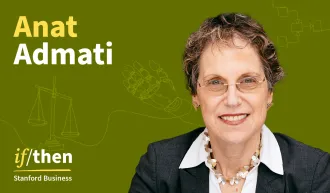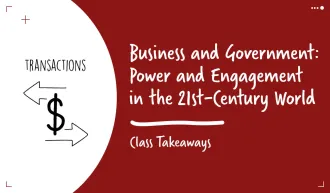
Tristan Walker | Courtesy
Tristan Walker is the founder of Walker & Company, which makes health and beauty products for people of color, and Code 2040, which fosters and supports minority engineering and tech talent. A former executive from Twitter and Foursquare, Walker pitched multiple ambitious, high-tech ideas to the venture capitalists at Andreessen Horowitz before discovering a relatively low-tech business that was in front of him all along: the Bevel line of shaving products. He received an MBA from Stanford Graduate School of Business in 2010. Walker talks to us about appreciating the difficulties of life, the effect of peering into another world of opportunity, and the ROI of authenticity.
In 10 words or fewer, what is the big idea behind your business?
Walker & Company makes health and beauty essentials for people of color.
What is the best advice you’ve ever received?
Actor and producer Tyler Perry said he realized his potential as an entrepreneur after he figured out that the trials you go through and the blessings you receive in life are the exact same things. The trials you go through are blessings in disguise. It has given me a lot of peace.
What was the most difficult lesson you have learned on the job?
The importance of authenticity. After leaving Foursquare, I spent seven months as an entrepreneur-in-residence at [venture capital firm] Andreessen Horowitz. I wasted a lot of time in the beginning. I tried to think of the most ambitious thing I could do and pitched them on building a bank, tackling diabetes, even disrupting freight and trucking. Ben Horowitz was honest with me and told me I wasn’t the best person in the world to solve those problems. In retrospect, I was trying to make other people happy versus pursuing things where I was an expert. I thought about doing hair products for women of color and talked myself out of it because I worried what people would think of me.
The difficult part of that lesson was in not being right. Throughout my life I heard a lot of yesses, from getting accepted to boarding school to interning on Wall Street, then going to Stanford and working at Twitter and Foursquare. All of a sudden I was hearing, “No. This isn’t a good idea.”
What advice would you give other entrepreneurs on how to build a great business?
You need to pursue the idea for which you are the best person in the world to solve that problem. It can be freeing. Even though other people may not see it and may tell you that you are wrong, if you are connected to that thing and know you are right, you can succeed. If you are doing something different, someone else with that same idea but with more authenticity will crush you. Jonathan Ive from Apple said in an interview that customers can discern care for a product and they can also discern carelessness. When you are authentic, you care more and that comes through in the product and the brand in such a compelling way that customers will believe it.
If there was one thing that has enabled you to be successful as an entrepreneur, what would it be?
I would not say I have been successful yet. We still have a lot of work to do. My brother taught me early on that you don’t get what you don’t ask for. I always go the extra step. If someone else asks once, I will ask six times until I get the thing I want. That has led to more opportunities as well as more innovation.
One example is our logo. We have printed the Bevel logo on our razor heads. It’s a curved metal piece inserted into another metal plate. When we were first designing it, manufacturers told me it was impossible. I flew to China to meet with our manufacturing team, and we sat together in a room for 24 hours until we came up with the most compelling compromise. It was just a matter of asking, “Why not?” enough times.
What inspires you?
I want my child of eight weeks to live in a world where he is not only respected as a consumer but also has the opportunity to produce on equal footing with everyone else.
How do you come up with your best ideas?
I come up with a lot of ideas and 99% are crap. When I hire, I find people who are so good at what they do that they filter my ideas down to the good ones. Together we can get to a place that is reasonable and realistic but also pushes boundaries of innovation to not be safe.
What is your greatest achievement?
Not forgetting who I am and where I came from. Some people let success get to their heads. I have tried to stay true to the values and principles that are important to me: my faith, family, and work. Anything outside of that is a distraction that prevents me from doing what I want.
What do you consider your biggest failure?
Being too safe earlier in my life. I thought I had to work on Wall Street to make my mom proud. I had no idea Silicon Valley even existed.
What values are important to you in business?
Courage. Inspiration. Respect. Judgment. Wellness. Loyalty.
Why are you an entrepreneur?
I have to be. I’m a terrible employee. I’m incredibly stubborn. I can be much more effective and have more impact as an entrepreneur than as an employee.
What was your first paying job?
I cleaned toilets at a summer camp when I was 14. It sucked! I decided I never wanted to do that ever again. It was right when I was about to go to boarding school in Connecticut. I grew up in Queens. At boarding school I saw how the other half lived, and it opened my eyes to what opportunity might look like.
Do you think there is such a thing as balance? How do you achieve balance in your life?
I used to try to do too much. Now I know I have to focus on the things that matter. For me it’s faith, family, and work. I just took a five-week paternity leave. There is only 100% of me. When I try to make it 110% it’s crazy. The three parts of my life are rarely in perfect balance. Sometimes it’s 50%, 40%, 10%. It is only when you’re not honest about those percentages to yourself or others that problems happen.
What is the best business book you have read?
Orbiting the Giant Hairball. It was written by a guy who made Hallmark cards. It’s about maintaining creativity in a corporate structure.
What businessperson do you most admire?
Andrew Carnegie. He was a titan of industry, and he cared very much about giving back. His journey in business was a means to that end.
What is the most valuable thing you took away from your time at Stanford?
It helped me to ask, “What if?” By doing that you can challenge the impossible.
What do you think is the greatest innovation in the past decade?
The iPhone was the first device that gave consumers the opportunity to be producers.
For media inquiries, visit the Newsroom.





